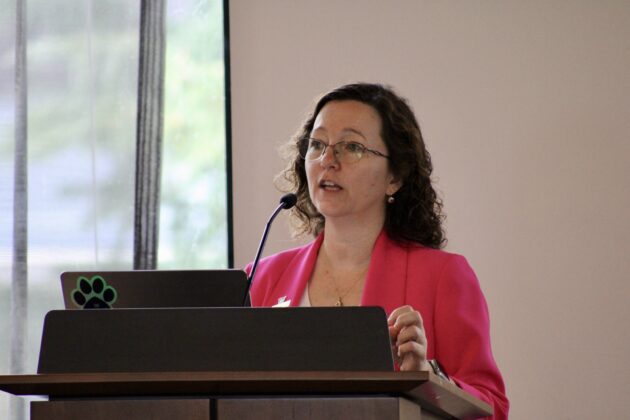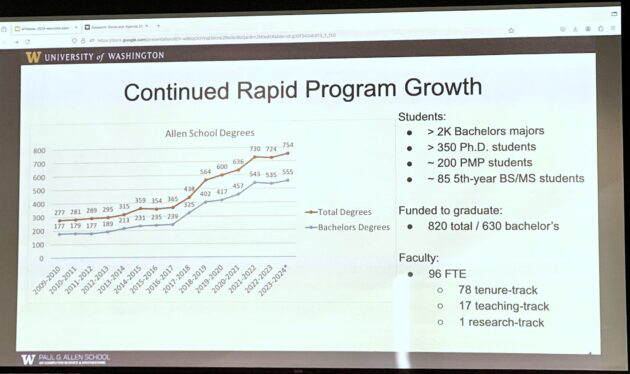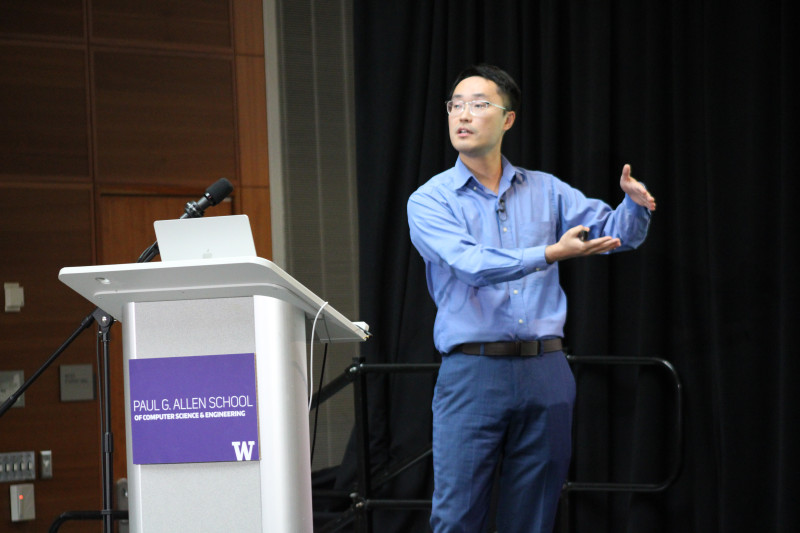How AI is reshaping the University of Washington computer science school
Artificial intelligence is taking center stage at the University of Washington’s computer science school.
The Paul G. Allen School of Computer Science & Engineering held its annual Research Showcase on Tuesday in Seattle, highlighting the latest projects, technologies, and research from UW students and professors.
AI was the focus for a majority of the day’s sessions, including a lunch keynote from UW assistant professor Sheng Wang on using generative AI for biomedicine, as well as the opening session hosted by Allen School Director Magdalena Balazinska.
Balazinska spent most of her presentation discussing the school’s AI-related initiatives, including recent AI startup spinouts and published papers.
“I know all of you do amazing work in industry,” Balazinska said. “But here at the Allen School, we also do really transformational, seminal work in this space.”

The Allen School is a crucial part of the broader Seattle tech ecosystem, helping educate computer scientists, future entrepreneurs, and tech company leaders, while also attracting leading researchers who have key industry roles while maintaining teaching positions at the UW.
“We have a very flexible policy that allows faculty members to keep a foot in academia and have a foot in industry,” Balazinska said. She cited Ali Farhadi, a former Apple leader and current CEO of the Allen Institute for Artificial Intelligence who is also a professor at the UW, as an example.

Balazinska highlighted seven “pillars of AI work” happening at the school, including: AI safety, fundamental AI, AI in the physical world, human-AI interaction, AI for health and biology, AI systems and infrastructures, and AI education.
The school, which has doubled the number of graduates in the past eight years, is also making a concerted effort to collaborate with other departments on AI.
AI has a much deeper impact across the university compared to other big technological shifts, said Shwetak Patel, the Washington Research Foundation Entrepreneurship Endowed Professor and an associate director with the Allen School.
“Every single unit on campus is using artificial intelligence to advance their research,” Patel told GeekWire.
AI also presents a new paradigm for educating computer science students, Patel said.

“We don’t have to go as deep into the fundamentals as much as we had to, because a lot of these tools are available,” he said. “It’s really understanding just enough of the fundamentals to be able to know which tools to use. It’s all around teaching them a new tool.”
The type of problems that students and researchers can tackle has also shifted with the AI. The technology is accelerating the process of synthesizing literature and running simulations, and software engineers “can start to work in domains that we couldn’t before,” Patel said.
Patel pointed to Wang, who is studying how generative AI can be used to analyze pathology images.
“This would have taken a huge collaboration between pharma and epidemiologists and public health workers, but now, [Wang] can do 60% of the work in a foundational model and then go straight to a study,” Patel said. “It just changes the way we approach science. That’s been fascinating.”

